 Petzlover
PetzloverBracco Italiano is originated from Italy but Bullenbeisser is originated from Germany. Both Bracco Italiano and Bullenbeisser are having almost same height. Bracco Italiano may weigh 6 kg / 14 pounds more than Bullenbeisser. Both Bracco Italiano and Bullenbeisser has almost same life span. Bracco Italiano may have less litter size than Bullenbeisser. Both Bracco Italiano and Bullenbeisser requires Low Maintenance.
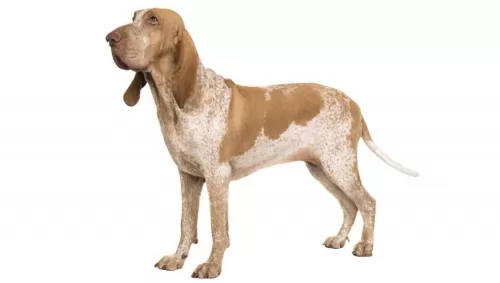 The attractive and popular breed in Italy, the Bracco Italiano was used for tracking and retrieving, evolving in Piedmont and Lombardy. It is believed the Bracco Italiano came about from crossing the Segugio with the ancient Asiatic Mastiff.
The attractive and popular breed in Italy, the Bracco Italiano was used for tracking and retrieving, evolving in Piedmont and Lombardy. It is believed the Bracco Italiano came about from crossing the Segugio with the ancient Asiatic Mastiff.
There are people however, who believe that the breed goes back to the St Hubert Hound, but it is certain that both hounds and gundogs are part of the breed’s ancestry. The dog only arrived in Britain in the last decade of the 20th century.
Known also as the German Bulldog, the Bullenbeisser was a strong dog which is now unfortunately extinct. There were two regional types – the Brabanter- and the Danziger Bullenbeisser.This Molosser-type dog was native to Germany and was bred for different hunting purposes.
Nobody is quite sure what dogs are included in Molossers, but they are essentially large dogs bred to hunting and rescue, tending to have a shorter muzzle. The Bullenbeisser is famous for the role the dog has played in the development of the wonderful dog we have today, the Boxer. In fact, some Bullenbeissers were crossed by the Boxer Kennel Club of Germany with Bulldogs from the UK.
Not much is known about the history of the Bullenbeisser, but the breed also has a history in the lands of the Holy Roman Empire. The dog was at first a type of Mastiff, large and with the typical brachycephalic head, and used for hunting because of their power.
To improve their dogs, many Bullenbeisser breeders began crossing their dogs with English Bulldogs, introducing a white coat to the Bullenbeisser. Other breeds were also crossed with the dog such as the Bull Terrier, but by the end of the 19th century, the traditional Bullenbeisser was slowly dying out. It was in the late 1870s that German breeders, Hopner, Konig and Roberth used the dog to bring about a new breed, which today is known as the Boxer.
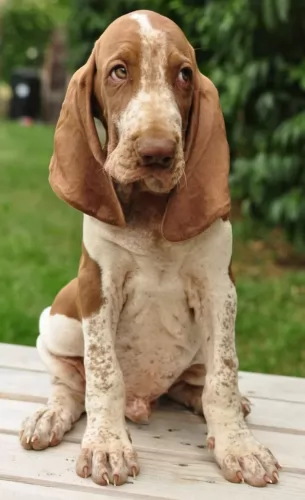 The Bracco Italiano is a large athletic, muscular dog. He stands at 58–67cm, weighing anything between 25 – 40kg. He reminds one somewhat of a German Short-haired Pointer. He has long ears and a serious expression, and this reminds one of a Bloodhound. He has short, shiny hair with his coat being white and chestnut or orange. The tail of the Bracco Italiano has always been docked, giving him an attractive, distinctive look but with rules and regulations coming in regarding docking, the long tail is often left intact. His eyes are brown.
The Bracco Italiano is a large athletic, muscular dog. He stands at 58–67cm, weighing anything between 25 – 40kg. He reminds one somewhat of a German Short-haired Pointer. He has long ears and a serious expression, and this reminds one of a Bloodhound. He has short, shiny hair with his coat being white and chestnut or orange. The tail of the Bracco Italiano has always been docked, giving him an attractive, distinctive look but with rules and regulations coming in regarding docking, the long tail is often left intact. His eyes are brown.
Braccos are wonderful pets – they are intelligent, loving, gentle and amicable, getting on well with children in the home as well as with other pets. Socialize and train them and they become gentle and obedient. They long to be involved with their human family and will adapt to life in the city or the country so long as they are made to feel like family. He is alert and makes a good watchdog. As with most other dogs, they can’t be bought, loved as a puppy and then ignored and left to themselves when they grow into adults.
The Boxers lineage comes from the Bullenbeisser. The Bullenbeisser was a fierce, courageous dog, noted for its hunting abilities. The dog was developed into the Boxer so that its body become more defined and more streamlined.
Described as a medium to large muscular dog, standing roughly 63cm in height, he would have weighed in the region of 32kg. He had a short coat, brown eyes and short to medium ears which were half erect, half floppy.
Brown to fawn in color, he had a long tail which was later docked to give the dog a more distinctive, attractive look. The dog also got its attractive fawn color from the English Bulldog. Loyal, active and loving, the Bullenbeisser was a true family dog with a close affinity to children.
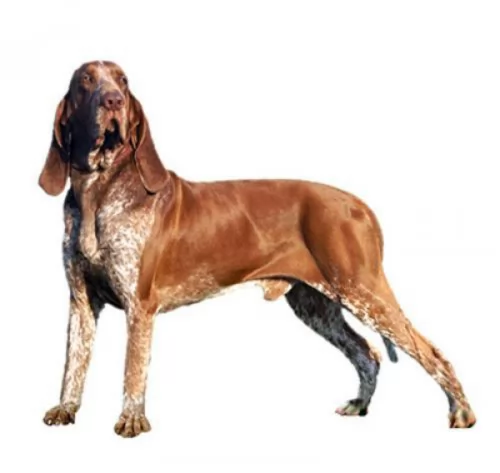 The gentle, amicable Bracco Italiano is a versatile dog that can be a super sport companion for active people and it can also be an exceptional companion for families and older people. He has a sweet, gentle expression and his amicable nature makes him easy to love. He is alert though, and therefore can be both protector and friend at the same time.
The gentle, amicable Bracco Italiano is a versatile dog that can be a super sport companion for active people and it can also be an exceptional companion for families and older people. He has a sweet, gentle expression and his amicable nature makes him easy to love. He is alert though, and therefore can be both protector and friend at the same time.
Overall, this easy going dog with his low maintenance coat can make an excellent 4-legged addition to any family.
Information on the extinct Bullenbeisser is limited, but because he was used to bring about the Boxer you can be sure that he would have been fearless, courageous and territorial of his property and of his human family.
The Bullenbeisser would have been a good watch-dog and with the right kind of loving care, a most awesome and loving family companion.
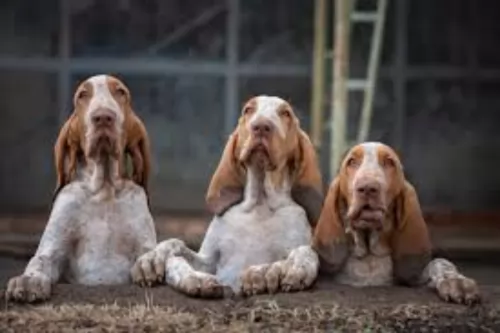 There don’t appear to be any major health issues with your Bracco Italiano and he can live to be 12, 13 or 14 years of age. Because he is a large breed however, you will need to watch out for hip dysplasia.
There don’t appear to be any major health issues with your Bracco Italiano and he can live to be 12, 13 or 14 years of age. Because he is a large breed however, you will need to watch out for hip dysplasia.
Hip dysplasia is a common skeletal disease with dogs and larger dogs have the genetic predisposition for hip dysplasia. Your dog can develop joint inflammation with pain and lameness.
Other health problems to look out for include kidney disease (Amaloidosis), cherry eye which results in dry eye. If you want to buy a Bracco Italiano, you should ask the breeder about the medical history of the parents.
In general, medium to large breeds like the Bullenbeisser have a lifespan of 10, 11 or 12 years. The life expectancy of these dogs relied much on the lifestyle they led and their diets.
The Bullenbeisser had a deep chest and this made dogs like this prone to gastric dilatation and bloat which can be life-threatening and which requires immediate veterinary intervention. The dog with this disease has distension of the abdomen and extreme discomfort, wanting to vomit but being unable to do so.
Hip Dysplasia is a disease which is more common in larger dogs and is an abnormal formation of the hip socket, resulting in lameness accompanied by painful arthritis.
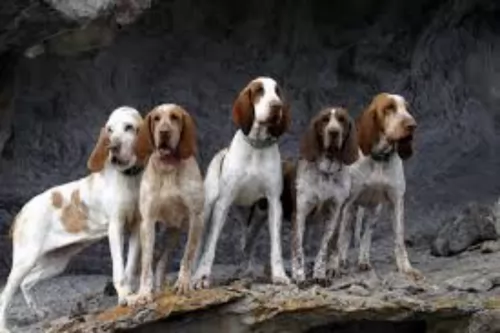 These dogs are moderate shedders so he will simply need a good brushing twice a week to ensure the coat is kept shiny and free from loose hairs. Nails should be clipped from time to time and he will also need to have his long ears checked for cleanliness. Long-eared dog breeds are more susceptible to canine ear infections.
These dogs are moderate shedders so he will simply need a good brushing twice a week to ensure the coat is kept shiny and free from loose hairs. Nails should be clipped from time to time and he will also need to have his long ears checked for cleanliness. Long-eared dog breeds are more susceptible to canine ear infections.
The Bracco is a large dog and therefore he will require a high quality, large-breed dog food formula. Your veterinarian can even recommend a quality commercially manufactured food for large, energetic dogs and which comes with all the vitamins and minerals required for such a breed.
Your vet will recommend you steer clear of foods with cheap fillers, lots of preservatives, sugar and colorants. He has a glossy, dense short coat and you want to ensure he gets raw meat, rice and vegetables from time to time to ensure that the beautiful coat never becomes dull and dry.
Cool, fresh water must always be available to him. Diet and nutrition is an important decision for your pet as it will ultimately affect his long term health.
The Bullenbeisser was a mastiff like breed with a short, easy-to-care for coat. He would have required a good brushing down at least twice a week to remove the coat from loose hairs. As an active, outdoor-type dog, he would have had to have his ears checked for dirt and the possibility of infection.
Although the Bullenbeisser was a hunting dog, he no doubt led an active outdoor lifestyle. Dogs such as the Boxer and the Mastiff, which are descendants of this dog are the kind of dogs which will need to be exercised regularly, taken on walks and given lots of running games with a ball.
As a medium to larger breed with lots of energy, the Bullenbeisser would have no doubt had home-made food from his master’s table. This food would have included meat and vegetables. As a hunting dog he would have had the chance to get in some raw meat which is imperative for the health of any domesticated dog today.